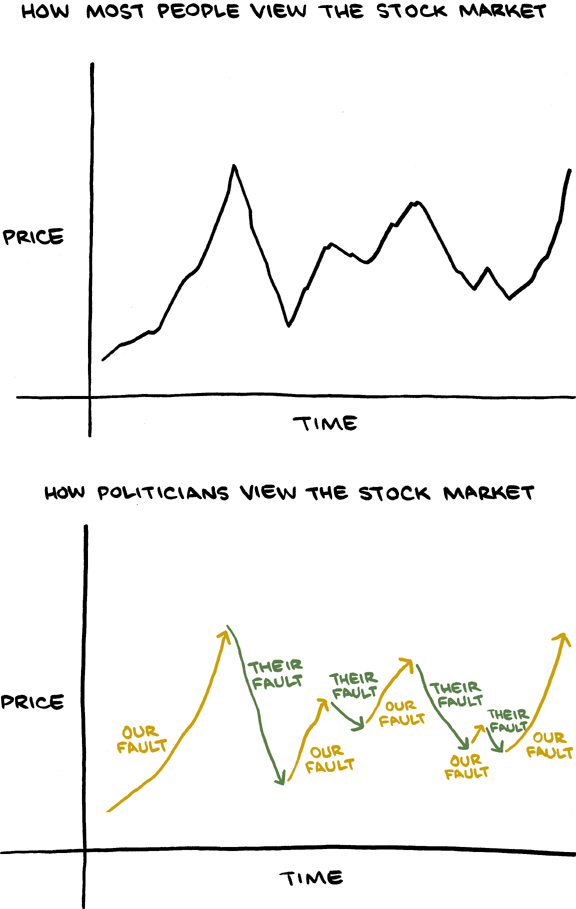Disgusting.
Stock Market
28-Feb-12

Via LiveScience:
The democratic process relies on the assumption that citizens (the majority of them, at least) can recognize the best political candidate, or best policy idea, when they see it. But a growing body of research has revealed an unfortunate aspect of the human psyche that would seem to disprove this notion, and imply instead that democratic elections produce mediocre leadership and policies.
The research, led by David Dunning, a psychologist at Cornell University, shows that incompetent people are inherently unable to judge the competence of other people, or the quality of those people’s ideas. For example, if people lack expertise on tax reform, it is very difficult for them to identify thecandidates who are actual experts. They simply lack the mental tools needed to make meaningful judgments.
As a result, no amount of information or facts about political candidates can override the inherent inability of many voters to accurately evaluate them. On top of that, “very smart ideas are going to be hard for people to adopt, because most people don’t have the sophistication to recognize how good an idea is,” Dunning told Life’s Little Mysteries.
You often see laments that most people don’t vote. However, that’s probably fortunate–most people are ignorant, irrational, and systemically biased toward bad policies. Just one example: according to a recent poll (1), the average American thinks that foreign aid makes up 25% of the Federal budget. It actually makes up about 1%. Do you really want people so ignorant influencing how your tax money is spent?
Rather than focus on encouraging more participation by irrational rubes, I think we should be thinking more about how to design a system that heavily weights the opinion of the well-informed, rational, and fair-minded experts. The two that look the most promising to me are futarchy:
http://hanson.gmu.edu/futarchy.html
…and social impact/policy bonds:
http://socialgoals.com/spbs600words.html
http://www.socialfinance.org.uk/work/sibs/criminaljustice
http://www.nytimes.com/2011/02/09/business/economy/09leonhardt.html
http://www.economist.com/node/18180436
(1) http://www.washingtonpost.com/opinions/five-myths-about-foreign-aid/2011/04/25/AF00z05E_story.html
Zombie Apocalypse Bedding
28-Feb-12

“Patrick Kennedy is a housing developer who likes to build small. His vision is to build the housing equivalent of the Smart Car, “What I want to do now is build the urban equivalent of Levittown – entry level, urban housing for about $200K each”.
His SmartSpaces will be small- just a couple hundred square feet- and prefabricated to be stacked on top of each other and side by side. Kennedy envisions this type of development as “a larger and hipper version of LEGO blocks“.
Building prefab allows him to construct faster and more efficiently (avoiding a lot of construction waste) and everything down to the lighting and type of furniture has been studied carefully so that space is maximized in the tiny units.”
Via faircompanies.com.
Do Repub
23-Feb-12
A friend recently linked to this article The Republican Brain: Why Even Educated Conservatives Deny Science — and Reality.
From the article:
“On the contrary, better-educated Republicans were more skeptical of modern climate science than their less educated brethren. “
My response:
More educated people know how messy science can be, and how often it is tainted by myside bias and groupthink. Remember when fat was the beta noire of nutrition? When soy was good for you? If we can’t even make authoritative statements about nutrition, where we can perform controlled experiments, how can be confident about what’s happening in the ecosystem?
Note the pejoratives the author uses: “idiot”, “authoritarian”, “denialist”. No recognition that science is provisional, that sometimes the minority position has proven correct, no assumption of good faith.
How many AGM believers have read the original literature? Or have the intellectual means to evaluate the claims of AGM researchers? Few people have the time, energy or inclination to investigate this issue in any great depth. I contend that most of those who believe in AGM do so because it is the accepted position of “their” side, not because they’ve done any better analysis than those they sneer at.
Conservatives and libertarians are not immune to this, of course. For example, here’s Dan Klein’s mea culpa for running a biased experiment that appeared to show that liberals were less economically literate:
http://www.theatlantic.com/magazine/archive/2011/12/i-was-wrong-and-so-are-you/8713/
Jonathan Haidt show that people–of all political persuasions–make snap judgments based on their moral intuitions, and then marshall evidence post-hoc to justify their moral intuition. Liberals, conservatives, and libertarians moral intuitions rest upon at least 6 different foundations. Check out this summary of his research here:
http://reason.com/archives/2010/11/02/the-science-of-libertarian
Conservatives and libertarians oppose AGM research a priori because the proposed solutions almost always violate their moral intuitions. How often do you see AGM believers propose market solutions? They almost always call for more taxes, more regulations, more government power. Therefore, AGM unbelievers see government funded AGM scientists as ideologically motivated stooges for leftist politicians who want to use AGM as a bludgeon to increase their political and economic power. (For which the stooges will be well-rewarded, in the form of government grants and sinecures at government-subsidized universities). Think about how well received results from tobacco or oil company funded researchers are received on the left, to see what I mean.
If AGM believers proposed solutions that appealed to conservatives and libertarians moral foundations, rather than liberal moral foundations, I think they’d find much less resistance to the science.
Another crime of the western stasi.
One day she asked Justin if he smoked pot. Even though he didn’t smoke marijuana, the love-struck teen promised to help find some for her. Every couple of days she would text him asking if he had the marijuana. Finally, Justin was able to get it to her. She tried to give him $25 for the marijuana and he said he didn’t want the money — he got it for her as a present.
A short while later, the police did a big sweep and arrested 31 students — including Justin. Almost all were charged with selling a small amount of marijuana to the undercover cops. Now Justin has a felony hanging over his head.
via Tony Newman: Attractive Undercover Cop Poses As Student And Entraps Teens To “Sell” Her Marijuana.
Why Sex Is Not Spiritual
21-Feb-12
Probably the biggest obstacle facing anyone who thinks or writes about sexuality is that the body is always suspect. The idea that our bodies are inherently flawed and corrupt and that what matters is our abstract self — whether you call it soul, spirit, mind, or whatever — is only slightly less universal than 1+1=2. It’s central to the religious teachings of the Catholic Church and the Dalai Lama, but it’s also laced into the more secular ideas of feminists who write about objectification, and transhumanists who long for the day when they can upload their consciousness into a cloud of nanites.
Our bodies can be seen, heard, felt, weighed. They bleed and sweat and shit and come. They eventually age and die. And bizarrely, that very substance is why they’re considered the most superficial parts of ourselves. Perhaps the sickest, most perverse part of religion’s legacy is the lie that followers should ignore their worldly suffering in favor of the bliss that will come in the afterlife, when they can leave the soiled impurity of the mortal shell behind.
via Why Sex Is Not Spiritual – San Francisco Arts – The Exhibitionist.
Tell the Senate to Legalize Crowdfunded Securities with Full-page Ad in Politico — LoudSauce
20-Feb-12
Should non-millionaires be able to invest small amounts in local businesses or other ventures that they believe in, without the ventures having to spend tens of thousands (or more) on state or federal securities compliance? We believe so, provided that the offerings can be seen and discussed openly, and have other requirements and limitations to prevent fraud. Without costing anything, such a regulatory change would create meaningful jobs, spur innovation, and fuel the economy.
But this is currently illegal thanks to securities laws written in the 1930s, when ordinary people had no way to check the claims of fraudsters armed with smooth telephone voices and fancy printed letterhead with New York City addresses.
Bipartisan efforts to modernize these laws and introduce a “crowdfunding exemption” have been progressing rapidly over the past year. H.R.2930, the Entrepreneur Access to Capital Act, overwhelmingly passed the House (407-17) last November, with White House support. Now it and two other crowdfunding bills (S.1791 and S.1970) are stalled in the Senate. Sources there say that the Senate needs to see that public interest in these proposals exists, before they will venture to consider them.
To demonstrate public interest (as well as the power of crowdfunding), we are launching a campaign to take out a full page ad in the Washington D.C. newspaper Politico, which is distributed in printed form to Congressional staffers and other DC types.
The House has already spoken, and the White House has told us that they are ready to sign – we now just have to push some demonstrable public interest in the Senate’s face.
via Tell the Senate to Legalize Crowdfunded Securities with Full-page Ad in Politico — LoudSauce.
The birth of monkey prostitution
20-Feb-12
Then there is the stealing. Santos has observed that the monkeys never deliberately save any money, but they do sometimes purloin a token or two during an experiment. All seven monkeys live in a communal main chamber of about 750 cubic feet. For experiments, one capuchin at a time is let into a smaller testing chamber next door. Once, a capuchin in the testing chamber picked up an entire tray of tokens, flung them into the main chamber and then scurried in after them — a combination jailbreak and bank heist — which led to a chaotic scene in which the human researchers had to rush into the main chamber and offer food bribes for the tokens, a reinforcement that in effect encouraged more stealing.
Something else happened during that chaotic scene, something that convinced Chen of the monkeys’ true grasp of money. Perhaps the most distinguishing characteristic of money, after all, is its fungibility, the fact that it can be used to buy not just food but anything. During the chaos in the monkey cage, Chen saw something out of the corner of his eye that he would later try to play down but in his heart of hearts he knew to be true. What he witnessed was probably the first observed exchange of money for sex in the history of monkeykind. (Further proof that the monkeys truly understood money: the monkey who was paid for sex immediately traded the token in for a grape.)
via Monkey Business – New York Times.